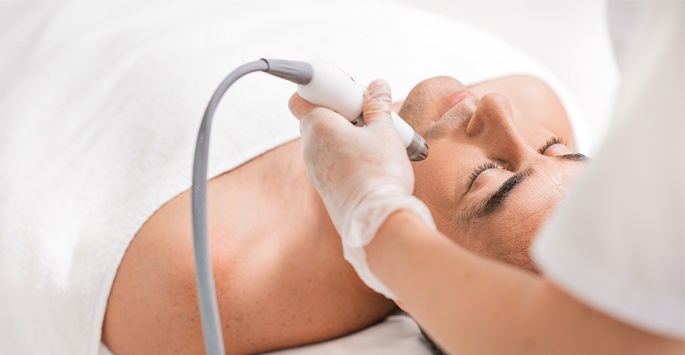
Aside from the obvious benefits such as wrinkle reduction and improved texture, what are some of the added medical benefits of getting a laser skin rejuvenation treatment?
Treating Pre-Cancerous & Cancerous Lesions
If you've spent a significant portion of your life outdoors with little or no sunscreen, you are incredibly likely to have significant sun damage beyond the signs of aging. Many of our patients are diagnosed with actinic keratoses, a type of pre-cancerous lesion that is common after extensive UV damage from spending time out in the sun and the use of tanning beds. In some cases, Fraxel and CO2 Laser Resurfacing may be effective at treating squamous cell carcinomas and thin basal cell carcinomas, particularly if they show up in sensitive areas such as around the eyes. Fraxel has been repeatedly shown to not just reduce the appearance of fine lines, wrinkles, and hyperpigmentation, but to improve the overall health of skin. It's demonstrated ability to heal skin traumas (scars, injuries, and burns) and improve stretch marks makes it an incredible crossover between cosmetically and medically beneficial.
Scars
For patients who have suffered with acne or other skin traumas throughout their life, the painful reality of the condition leaves its mark well in multiple forms. For some, scars may fade over time but for others, pigmentation issues, atrophic scars, and keloids can leave skin looking uneven and appearing as if it's still blemished. For mild cases, a series of Clear + Brilliant or chemical peels may prove effective over a period of time and will give patients the added benefit of limiting downtime. And for particularly stubborn hyperpigmented scars, Fraxel is highly efficient at reducing or eliminating their appearance entirely. However, extreme cases of redness and deep scarring are typically only resolved using CO2 Laser Resurfacing. CO2 is able to deeply penetrate into the skin to rehabilitate scarred tissue and stimulate the production of new, healthier collagen in the skin. This will provide a natural lifting effect, brightening and evening out the skin.
Rhinophyma
Rhinophyma is a condition causing development of a large, bulbous nose associated with granulomatous infiltration, commonly occurring as part of phymatous rosacea. It is more common in fair-skinned men between the ages of 50-70, and while the exact cause is unknown, it is typically considered to be the result of poorly treated or untreated rosacea. Medications are available for treatment, however, are often not regarded as effective. For patients who are trying to avoid going through a difficult surgical procedure, CO2 has proven itself to be a safe and powerful treatment for the condition, allowing for a more comfortable recovery.
Telangiectasia
Telangiectasia is a condition in which widened venules (tiny blood vessels) cause threadlike red lines or patterns on the skin. These patterns, or telangiectases, form gradually and often in clusters. They’re sometimes known as “spider veins” because of their fine and weblike appearance. Telangiectases are common in highly visible areas such as the lips, nose, eyes, fingers, and cheeks. While the exact cause is unknown, it can be genetic, environmental, or both. While surgery and sclerotherapy are possible treatments of Telangiectasia, the simplest and most comfortable treatment is with VBeam, a pulsed dye laser that can dramatically reduce the appearance of any redness, including telangiectasia, in one session or a series of sessions, depending on the severity of your case. It's also effective for reducing certain types of birthmarks, scars, rosacea, and cherry angiomas.
To learn more information about laser treatments that may be suitable for you, set up a consultation at Supriya Aesthetic Dermatology, with offices in West Palm Beach and Jupiter. Contact us today to schedule an appointment and see how our laser procedures can benefit you!
Talk to us
Interested in trying our procedures? Contact us today for a free consultation
and see if any of our laser therapy treatments are right for you.


